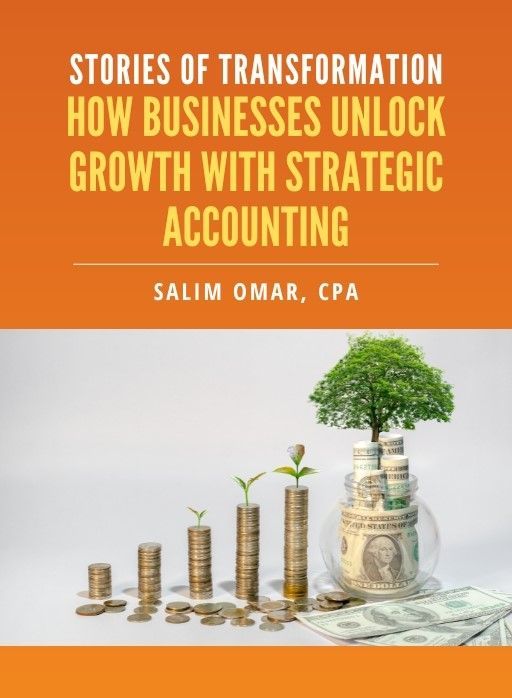Top 10 Accounting Trends Small Businesses Must Know in 2024

Falling behind on the latest accounting and finance trends can cost you. As a small business owner, you already have enough on your mind and on your to-do list, and keeping up with the latest developments might feel like a burden. But ignoring these shifts isn’t just risky—it could leave you scrambling to catch up while your competitors pull ahead.
The pace of change in accounting is relentless. It feels like 2024 has been tougher than any prior year we’ve ever seen. New technologies, evolving regulations, and emerging tools can make you feel like you’re constantly playing catch-up. It’s honestly overwhelming, and it can drain your time, resources, and energy. But we have good news for you: you don’t have to do this alone.
Maybe you’re wondering whether automation is really worth the investment, or how cloud-based software could actually make your life easier. Perhaps you’re concerned about data security or curious about how AI might change the way you do business. Whatever questions or concerns you have; this article is here to guide you through the top 10 accounting trends that will matter most for small businesses in 2024. These insights aren’t just about staying current—they’re about staying relevant and ensuring your financial foundation is rock-solid. Let’s dig in and see what’s ahead.
Trend 1: Automation in Accounting
It’s the 21st century and if you’re still handling the bulk of your accounting tasks manually, then we need to talk. Manual processes, especially accounting-related tasks, are time-consuming, possibly costing you money, and pulling you away from other value-added activities. You know this but these activities can also increase the risk of errors that could hurt your bottom line. Imagine spending hours on data entry, only to realize a small mistake threw off your entire balance sheet. It’s frustrating, and it’s avoidable.
Automation in accounting is no longer a ‘nice to have’ feature in your business; it’s a necessity. By automating routine tasks like invoicing, payroll, and bank reconciliation, you can save valuable time and reduce the likelihood of costly mistakes. More importantly, automation tools give you back the time you need to focus on growing your business rather than getting bogged down reconciling your bank ledger to your bank statement.
But it doesn't stop there. Automation also provides real-time insights into your finances, helping you make smarter decisions faster. Tools like QuickBooks Online and Xero offer automated features that sync with your bank accounts, track expenses, and even remind you of upcoming deadlines. This will allow you to spend less time worrying about your finances and more time running your business.
But we get it, if you’re hesitant about diving straight into automation, start slow. Some folks like the idea of having their hands in everything, and automation helps to pull your hands out of most of those repetitive job functions. Begin with one task, like automating your invoicing, and see the difference it makes. As you grow more comfortable with the process, you can expand to other areas of your accounting. The key is to take that first step toward a more efficient, less stressful way of managing your business’s finances.
Trend 2: Cloud-Based Accounting Software
If you’re like most businesses then you still might be comfortable with desktop accounting software systems, but truth be told, it’s holding your business back from growth and simplicity. The reality is, relying on outdated, archaic systems can make accessing your financial data a tremendous burden for you, your employees, and external accountants. Imagine a scenario where you're out of the office and either an employee or your CPA needs a report or document from your QuickBooks Enterprise system, you'll have to go back to the office to get it if you're not using a cloud-based system.
If you want to avoid this scenario then we welcome, you to the world of cloud-based accounting software. When we mention ‘cloud-based accounting software’ solutions, we’re talking about QuickBooks, Xero, Zoho Books, and so on. To see our top picks for small business accounting software, check out this article here. All these platforms offer you real-time access to your financial information anytime, anywhere. So, no matter if you’re at an offsite client meeting, on vacation, or working from home, your accounting books are a few clicks away. And this isn’t just about convenience; it’s about empowering you to make better, informed decisions in real-time, no matter where you are.
Trend 3: Integration of AI and Machine Learning
AI tools like Claude, Google’s Gemini platform, and ChatGPT, are all the rage right now and for very good reason. Before AI, trying to keep up with endless Microsoft Excel spreadsheets and financial reports was extremely tedious, time-consuming, and prone to errors. Even if you have the very best intentions and are careful as possible, you could still miss an important detail which could lead to costly mistakes. It’s frustrating to spend so much time on a task when you feel like there should be an easier way to handle these tasks.
And that’s where AI and machine learning tools step in. These technologies can analyze vast amounts of data quickly, identifying patterns and insights that would take you hours, if not days, to uncover on your own. Imagine software that not only tracks your expenses but also predicts cash flow issues before they happen. Or tools that help you optimize your tax strategies based on real-time data, reducing your liabilities and boosting your bottom line.
The primary focus of these AI tools is to help you make smarter, more informed decisions. These AI applications are capable of learning your business’s financial history and can offer personalized recommendations tailored to your specific needs. Whether it’s identifying trends in customer behavior, forecasting future sales, or even automating your entire budgeting process, AI is transforming the way small businesses operate.
If you’re hesitant about diving into AI, start by integrating it into a single aspect of your accounting, like automating your expense tracking or invoice processing; that’s a great place to start.
Trend 4: Enhanced Data Security
In this day and age, your business’ security needs an impenetrable wall from the most threatening cyber security threats out there. The 2024 CrowdStrike Global Threat Report highlights a 75% increase in cloud intrusions compared to previous years, signaling a growing trend as more businesses move their operations online.
Additionally, Deloitte's Cybersecurity Threat Trends report from 2024 notes a staggering 400% increase in IoT malware attacks, which demonstrates how cybercriminals are adapting to new technologies faster than many businesses can secure them. Because of this, small businesses are becoming increasingly vulnerable to attacks that could compromise sensitive information. A single breach could lead to financial losses, legal troubles, and a damaged brand reputation that might be hard to repair.
That’s why it’s important to invest in technology with enhanced data security features. Thankfully modern accounting software platforms such as QuickBooks and Xero are stepping up to bat offering their clients advanced security features and enable you to protect your data from cyber threats. These platforms use data encryption, multi-factor authentication, and regular security updates to keep your information safe. They also provide audit trails and real-time monitoring to detect any suspicious activity, giving you peace of mind that your data is being watched over 24/7. This means you can focus on running your business without constantly worrying about potential breaches.
Trend 5: Outsourcing Accounting Functions
Managing every aspect of your business’s finances can become overwhelming. Running your business usually requires you to wear multiple hats. When each of those hats go on, it ultimately pulls you away from other value-added activities where your knowledge and expertise would really shine.
That’s why more small businesses are turning to outsourcing for their accounting needs. Outsourcing allows you to hand off time-consuming tasks like bookkeeping, payroll, and tax preparation to professionals who specialize in these areas. This not only frees up your time but also ensures that your finances are managed with a high level of expertise, reducing the risk of costly errors.
When you consider outsourcing you gain access to a team of experienced accountants and bookkeepers who stay up to date with the latest regulations and technologies. This means you’re less likely to run into compliance issues and more likely to find opportunities for tax savings and financial optimization. Plus, with the right outsourcing partner, you can scale services up or down as your business grows, ensuring you only pay for what you need.
If you’ve been managing your accounting in-house, outsourcing might seem like a big leap. But for many small businesses, it’s a strategic move that allows them to focus on what they do best while leaving the complexities of accounting to the experts.
Trend 6: Increased Focus on Sustainability Accounting
Today companies just don’t want to be financially viable, they also want to be socially and environmentally responsible as well. Sustainability accounting, also known as environmental accounting or social accounting, is a method of accounting that goes beyond traditional financial metrics to include the social, environmental, and economic impacts of a company’s activities. It aims to provide a more comprehensive view of a business's performance by measuring and reporting on factors such as carbon emissions, energy consumption, water usage, waste management, and social impacts like community involvement or employee well-being.
This type of accounting is designed to help businesses understand and manage the sustainability of their operations. It also allows companies to demonstrate their commitment to sustainability to stakeholders, including customers, investors, and regulators. By incorporating sustainability metrics into financial reporting, businesses can make more informed decisions that align with long-term environmental and social goals, as well as prepare for increasingly stringent regulatory requirements related to sustainability.
Trend 7: Emphasis on Real-Time Reporting
Business owners and accounting professionals alike want access to real-time insights into their financial data in order to make an informed business decision. If you’ve been simply waiting for the end of the month report to see how your business is performing, then you’re opening the door to cash flow problems and missed opportunities.
Modern accounting software solutions can provide you with visibility into your numbers with a few clicks. Whether it’s tracking expenses, revenues, or inventory levels, real-time data gives you a clear and current view of your financial position. This allows you to react quickly to changes, optimize operations, and seize opportunities without delay.
The benefits of real-time reporting extend beyond just having up-to-date numbers. It also enhances your ability to forecast, plan, and strategize effectively, as you’re always working with the most accurate and timely information. Tools like QuickBooks Online, Xero, and other cloud-based platforms offer robust real-time reporting features that can be tailored to the needs of small businesses.
Incorporating real-time reporting into your accounting practices isn’t just about keeping up with the times—it’s about gaining a competitive edge by making smarter, faster decisions.
Trend 8: Adoption of Blockchain Technology
Blockchain is making a significant impact in the world of accounting. If you’re familiar with cryptocurrencies, then you probably heard of blockchain technologies before. But what does blockchain have anything to do with accounting and what benefits is it providing for a small business owner like me? We’re glad you asked. For small business owners, this technology offers enhanced transparency, reduced fraud, and provides you with a more efficient process. At its core, blockchain is a secure, tamper-proof digital ledger that records transactions in a way that can’t be altered once logged.
One of the main advantages for small businesses is the increased security and accuracy of financial records. With blockchain, every transaction is permanently recorded, which means less risk of fraud and errors. This technology also simplifies audits since all transactions are accessible in a decentralized ledger, making verification quicker and more reliable.
While still considered an emerging technology, blockchain is rapidly gaining ground in the accounting world. If you’re an early adopter, this technology can leverage your business to stay ahead, benefiting from its security and efficiency.
Trend 9: Remote Work and Virtual Accounting Teams
If there’s one positive takeaway from the pandemic, it’s this: remote work has reshaped how businesses operate and execute their operations. For small businesses, the ability to work with virtual accounting teams offers you immense flexibility and access to a broader talent pool regardless of their location. This trend was also put into hyperdrive because of the advancements seen in cloud-based software platforms. This makes it much easier for you, the business owner, to collaborate with accountants and bookkeepers who aren’t physically in the office with you.
Virtual accounting teams bring several advantages. They allow businesses to hire specialized talent without geographical constraints, often at lower costs than maintaining an in-house team. Additionally, remote work arrangements can lead to greater efficiency, as accountants can access and update financial data in real-time from anywhere, ensuring that business owners have up-to-date information at their fingertips.
The rise of virtual accounting also means small businesses can scale their accounting needs up or down as required, without the long-term commitment of traditional employment contracts. This flexibility is particularly valuable for growing businesses that need to adapt quickly to changing circumstances.
Trend 10: Personalized Business and Financial Advice through Advanced Analytics
Advanced analytics are changing the game for small businesses by offering financial advice that’s anything but a one-size-fits-all solution. Instead of relying on generic recommendations, these tools dive deep into your business’s specific data—like sales trends, expenses, and customer behavior so this information can provide you insights that are tailored to your unique situation. This means you’re not just guessing at what might work; you’re making decisions based on real-time data that directly impacts your bottom line.
Think of it as having an accounting or business advisor who knows your business inside and out, but without the added expense. Whether you’re looking to optimize cash flow, cut unnecessary costs, or forecast future growth, advanced analytics can give you the precise, actionable advice you need to make smarter, more informed decisions. And the best part? These tools are now accessible to small businesses, leveling the playing field with larger competitors.
By incorporating advanced analytics into your accounting practices, you’re not just keeping up—you’re staying ahead, ensuring every financial move you make is backed by solid data. It’s a strategic shift that can help you navigate both everyday challenges and long-term planning with confidence.
How the StraightTalkCPAs Team Can Help Your Business Plan for the Future
The StraightTalkCPAs team is here to help you position your small business for success in 2024 and for the future as well. While we find all of these trends relevant in our accounting world, it’s not recommended to try and incorporate all of these into your business. Some current trends will be more important to you than others. Cloud-based software solutions, optimized data security, and automation should be at the top of your list while trends like sustainability accounting, although important, might not be relevant to your needs right now.
It's always best to work with a team of professionals who can offer tailored advice to help you prioritize the trends that will best grow your business. That’s what the StraightTalkCPAs team is here for! Contact us today. Reach out by clicking here or calling us at 732-566-3660.
Free eBook:
Stories of Transformation


Salim is a straight-talking CPA with 30+ years of entrepreneurial and accounting experience. His professional background includes experience as a former Chief Financial Officer and, for the last twenty-five years, as a serial 7-Figure entrepreneur.




